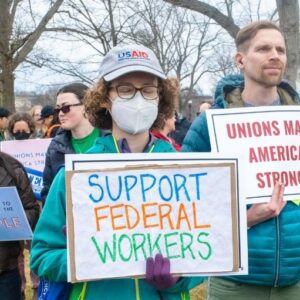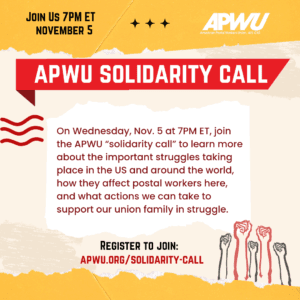March 1, 2015
Social-Movement Unionism: A Much-Needed New Model
(This article first appeared in the March-April 2015 issue of The American Postal Worker magazine.)
Unions were formed to defend workers and secure for them a share of the wealth they create. There have been labor unions in the U.S. since colonial times, working for that very purpose. Deriving their power from organized people and organized money, many unions have been able to successfully fight for the workers they represent. Unions have also achieved success when they united with others outside the workplace, to fight for social and economic justice.
Unions have always had to move beyond their narrow work issues. Grievances about overtime, breaks, holidays, and staffing are workplace fights. On the other hand, concerns such as racial discrimination, public education, voting rights, women’s issues, child labor, minimum wage, Social Security and unemployment insurance, have been taken on by unions because these societal issues affect their members, families and neighbors.
Workers do not live in a vacuum, we live in communities. When services are cut, roads and bridges start to crumble, schools lack sufficient funding, and family and friends are denied fundamental rights. These issues also affect postal workers.
However, there have been many times the union didn’t get involved in social issues because some of our members think we should only be involved in bread-and-butter issues: job issues. They believe that unions should only fight for workers in the workplace.
When you say that we shouldn’t get involved in an issue of social justice or human rights, you actually are taking a position on the issue.
When you ignore or evade these types of social justice issues, you are making a decision to allow the injustices to continue.
Get Involved
Some union members are content because they feel fortunate to have a union job. They think they can isolate themselves from the problems affecting the rest of society. We can’t just concentrate on our own interests and hope that some benefits will trickle down to other workers.
We have to join the fight for a living wage.
We have to fight for fast food workers and Walmart employees.
We have to fight for equal pay, against discrimination and against exploitation of working people and their families.
What we need now is a new model of unionism.
Instead of the “service model” where the union serves the members by filing grievances and fighting over workplace issues, we need to move toward being a “social movement unionism.” This model means that we would work with our allies jointly on social and economic justice issues, as well as have them assist us with some of our own issues.
New Generation, New Issues
Aligning with social-justice movements (for accountable policing, good immigration policy, fair housing, workers’ right to organize, equality and living wages) can be compared to the relationship of unions and the different movements in the 1960s and 1970s.
When union members and leaders expanded their activities to join in the fight for social and economic justice, labor cemented an alliance that remains strong today. That same concept can work today in our fight to save universal postal service for the public.
In our fight to defend postal workers and preserve the Postal Service, we will need allies. We gain allies when we show that we are willing to support their issues, rather than just expecting them to support ours. We know that we will not be able to save the Postal Service, keep postal facilities open, and get a decent contract without these allies. What better way to determine who our allies may be than by their stand on social and economic justice and their willingness to take action? The enemies of working people are the ones who perpetrate injustice.
It’s time for postal workers to think about a different model of unionism. The old model of just concentrating on our internal issues is not the model that will save the service and protect our members.
Congress won’t legislate us out of the crisis; we can’t grieve ourselves out of this crisis, and it won’t just happen. Our co-workers, our friends, our allies, even our enemies must know that we will organize and fight our way out of this crisis. We must save the Postal Service for ourselves and the American public.
In the preface to their book, Solidarity Divided, authors Bill Fletcher Jr. and Fernando Gapasin state the case most eloquently: “We contend that labor renewal in the United States depends on the adoption of a different theory and practice of trade unionism than has prevailed until now.”
Change won’t happen because we want it to happen, it will happen because we will make it happen. We have to change if we expect to win this fight. We need a model of unionism that includes fighting with and for our allies. We need social justice unionism.



